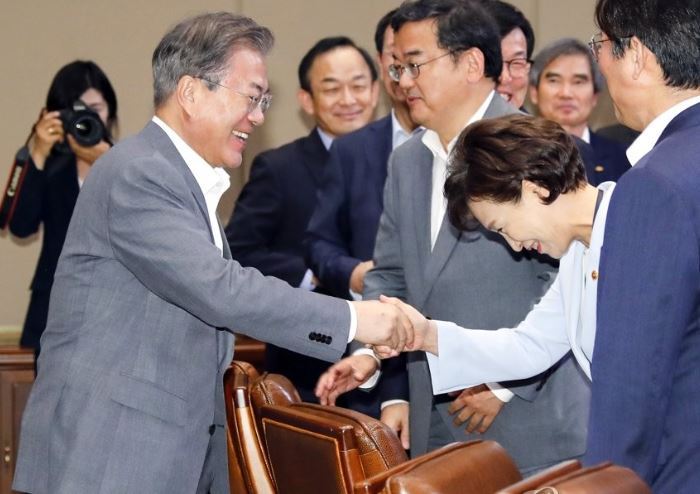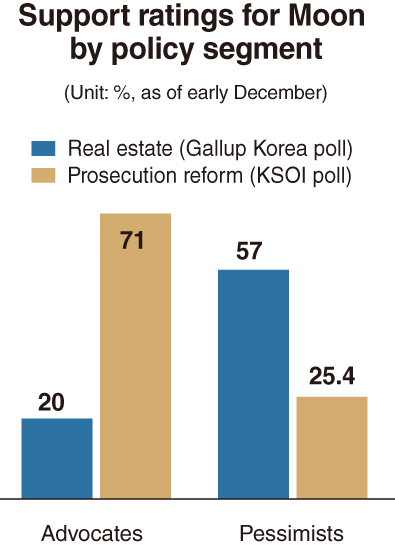[News Focus] Only 1 in 5 support Moon’s apartment policies: poll
By Kim Yon-sePublished : Dec. 12, 2019 - 16:44
SEJONG -- The approval ratings for President Moon Jae-in have recently inched up to hover around 45 percent, according to a variety of surveys by major pollsters.
A noteworthy point in the latest polls was that citizens showed wide disparity in their approval or disapproval of the president according to policy segments. This was seen in support ratings for Moon between real estate policies and prosecution reform.
According to a survey from Gallup Korea -- conducted Dec. 3-5 and released Dec. 8 -- the support rating for Moon climbed to 48 percent. It marked the highest score in four months after ranging between 39 percent and 47 percent since early August.
Nevertheless, only 1 out of every 5 (20 percent) of the 1,000 surveyed said the incumbent administration “is doing well” in real estate policies. More than half (57 percent) expressed their skepticism in the segment.
A noteworthy point in the latest polls was that citizens showed wide disparity in their approval or disapproval of the president according to policy segments. This was seen in support ratings for Moon between real estate policies and prosecution reform.
According to a survey from Gallup Korea -- conducted Dec. 3-5 and released Dec. 8 -- the support rating for Moon climbed to 48 percent. It marked the highest score in four months after ranging between 39 percent and 47 percent since early August.
Nevertheless, only 1 out of every 5 (20 percent) of the 1,000 surveyed said the incumbent administration “is doing well” in real estate policies. More than half (57 percent) expressed their skepticism in the segment.

Further, the approval ratio (33 percent) was outnumbered by the disapproval ratio (42 percent) among those who identified themselves as supporters of the ruling Democratic Party of Korea.
Among those who identified themselves as supporters of the right-wing Liberty Korea Party and far left-wing Justice Party, the percentage of approval for Moon’s property policies was just 7 percent and 18 percent, respectively.
By region, the approval rating was highest in Seoul, at 24 percent, where housing prices have skyrocketed -- up to 100 percent at some apartment complexes -- since Moon took office in May 2017.
But 59 percent of residents in the capital said the president “is not doing well.”
He posted a 22 percent approval in real estate policies in Gyeonggi Province-Incheon, while the figures for most of the other areas stayed under 20 percent -- Gwangju-Jeolla provinces (19 percent), Daegu-North Gyeongsang Province (19 percent), Busan-South Gyeongsang Province (12 percent) and Sejong-Daejeon-Chungcheong provinces (12 percent).
Women’s support ratings for the segment stood at 18 percent, while that of men marked 22 percent.
According to a poll by Realmeter and Kukmin Ilbo, which was released Tuesday, 76.7 percent of respondents predicted further growth (38.5 percent) or maintenance (38.2 percent) at the current level in apartment prices next year. Only 18.2 percent said prices would fall.
“These public opinions indicate that ordinary households across the nation have been frustrated by the widening asset gap between residents in Seoul and those in other areas, and the gap between the home owners in Seoul and those not owning homes,” said a real estate agent in Gyeonggi Province.

On the contrary, the majority of people were still supporting the administration’s policy to scale back the power held by the prosecution and crack down on some prosecutors’ irregularities.
A poll conducted by Korea Society Opinion Institute, which was publicized on Dec. 3, showed that 71 percent of the 1,000 surveyed expressed support for parliamentary passage of the fast-tracked bill on creating a Senior Civil Servant Crime Investigation Unit. Only 25.4 percent were opposed.
The new independent investigative agency, if its bill passes through the National Assembly, will have the authority to investigate and possibly indict prosecutors or other high-profiled officials who are implicated in criminal conduct.
As an eye-catching point, advocates for the establishment of the entity as part of the prosecution reform scheme outnumbered opponents in Daegu-North Gyeongsang Province, the home turf of the right-wing Liberty Korea Party, by 65.6 percent to 30.2 percent.
The approval proportion for the segment was the highest in Gwangju-Jeolla provinces with 89.6 percent, followed by Sejong-Daejeon-Chungcheong provinces with 76.1 percent, Seoul with 73.5 percent and Gyeonggi Province-Incheon with 70.3 percent.
By occupation, the advocate portion was highest among white-collar workers at 78.8 percent and second-highest among college students at 75.4 percent.
By income level, approval for the entity to probe prosecutors was highest among those whose monthly household income is 5 million won ($4,200) or over at 76 percent, trailed by among those with 2 million-5 million won at 71.2 percent and among those with 2 million won or under at 61 percent.
By Kim Yon-se (kys@heraldcorp.com)












![[From the Scene] Monks, Buddhists hail return of remains of Buddhas](http://res.heraldm.com/phpwas/restmb_idxmake.php?idx=644&simg=/content/image/2024/04/19/20240419050617_0.jpg&u=20240419175937)


![[From the Scene] Monks, Buddhists hail return of remains of Buddhas](http://res.heraldm.com/phpwas/restmb_idxmake.php?idx=652&simg=/content/image/2024/04/19/20240419050617_0.jpg&u=20240419175937)

![[KH Explains] Hyundai's full hybrid edge to pay off amid slow transition to pure EVs](http://res.heraldm.com/phpwas/restmb_idxmake.php?idx=652&simg=/content/image/2024/04/18/20240418050645_0.jpg&u=20240419100350)

![[Today’s K-pop] Illit drops debut single remix](http://res.heraldm.com/phpwas/restmb_idxmake.php?idx=642&simg=/content/image/2024/04/19/20240419050612_0.jpg&u=)